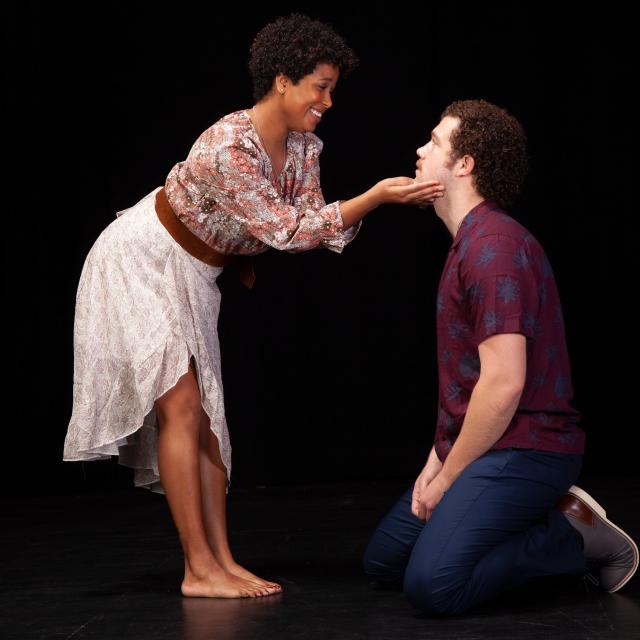
A contemporary take-off on Everyman, the most famous English medieval morality play, Everybody still requires the title character to face death. But instead of emphasizing having to account for a life’s good and bad acts to God for placement in the afterlife. Brandon Jacobs-Jenkins’s Everybody lead must reflect mainly on life’s meaning both to self and the society left behind. Just as church people directed attendants to pay respectful attention to a morality play, Macharia Martinez commandingly reminds the FSU/Asolo Conservatory audience to observe etiquette at start of today’s play. (She impresses too as God and Understanding later.) Soon Death (Jerald Wheat) appears bringing light into the audience so he can be seen fearless and authoritative asking if they believe in God.
A big, round sound brings to the stage 5 Everybodies that Death tells to come with him under his control. A compromise results in getting someone who will go with Death for them. A wheeling-ball lottery turns up the leading Everybody (excellent Evan Stevans when I attended). He further wins a plea that he can get a friend to stay with him, help establish his better-than-bad life’s worth to society, and be in a good place after leaving it. (A typical author’s production dictate is that the role of Everybody goes to a different actor each night. He or she does not know who’s chosen until just before the play starts.
This extends the life’s lottery concept. In this case, it also adds to the Conservatory students’ training.)
Everybody has trouble not only remembering his relevant actions but getting companions from Friendship, Kinship, and a Girl in the front audience who all get out of sight. Is it because he’s, as usual, selfish? Just dragging someone in to help him, not trying to help someone else? Does Everybody think he’s the greatest type of person (i.e., race) and none on stage would be appropriate in his and their minds? What about all the stuff that would have to be left behind?
Is it all a dream? What does it all mean? Sydney Story’s Love contributes the best emotions and commitments to Everybody’s plight. Imani Williams’ in an epilogue by Time and Martinez’s Understanding both cogently offer answers to Everybody’s—and the audience’s— wonderings.
It’s a treat to see a well choreographed, lit, and matching costumed finale after many scenes of dark-to-light and reverse both on off the stage. The simple set of red and black floors, with a height upstage created as if bricked in and a stark black background with a center inset. A simple iron, coffin-shaped “gate” is erected toward the end to allow Everybody and companion to walk to an afterlife. Sound, though, sometimes is a bit overwhelming, especially in changing scenes.
Much credit goes to Greg Leaming for his sure hand in directing the actors, who all perform without hesitations or other problems in adapting to each performance’s difference. Their ease in movement belies their early class standing in the Conservatory’s program and must reflect teaching by Eliza Ladd. Jonathan Epstein typically stages the production to respect the medieval Everyman legacy and add to the future of the play Everybody.
